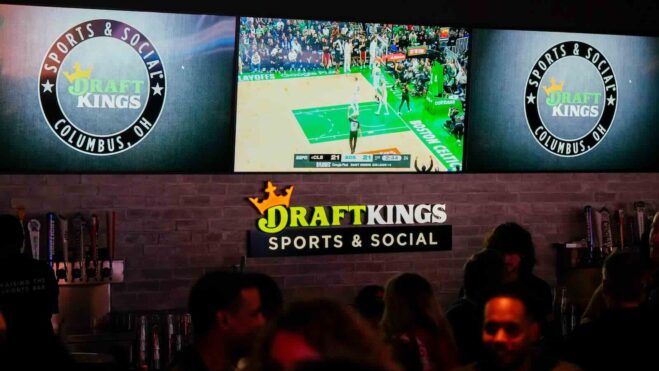Federal Circuit Affirms Dismissal Of Beteiro’s Lawsuit Against DraftKings And Others
DraftKings, BetMGM, and other sportsbooks are safe after a federal court rejected a lawsuit against them for alleged patent infringement.
3 min

In a decision issued Friday, the Federal Circuit upheld a New Jersey district court’s ruling to dismiss Beteiro, LLC’s patent infringement claims against DraftKings, Inc., BetMGM, and other defendants.
The court concluded that the patents in question were directed toward subject matter that can’t be patented under 35 U.S.C. § 101. This ruling, Beteiro, LLC v. DraftKings Inc., No. 2022-2275, centered around patents related to methods for permitting remote betting or gambling using GPS-equipped devices.
Background of the case
Beteiro’s primary patent claim outlines a method designed to facilitate remote betting, similar to what is offered through geolocation. This method involves several key steps: gathering information about a gaming or sporting event, alerting the user about the event, and receiving a bet from the user.
It then decides whether to accept or reject the bet based on the user’s location. The goal of this system is to ensure that online gambling complies with the legal restrictions of different regions.
To determine the patent eligibility of Beteiro’s claims, the court used the two-step Alice/Mayo framework. This framework, established by the Supreme Court in the cases Alice Corp. v. CLS Bank International and Mayo Collaborative Services v. Prometheus Laboratories, requires an analysis of whether the claims are directed to a patent-ineligible concept, such as an abstract idea.
If they are, the next step is to see if the claim elements add something extra that transforms the abstract idea into a patent-eligible application.
Step by step
In the first step of its analysis, the Federal Circuit determined that Beteiro’s claims pertained to the abstract idea of “exchanging information about a bet and deciding to allow or disallow the bet based on the user’s location.” The court noted that the claims involved some elements indicative of abstractness, including basic actions like detecting information, sending notifications, receiving messages, making decisions, and processing information. These elements were similar to other claims previously deemed abstract in legal precedents.
Beteiro contended that their claims were linked to technological advancements because they uniquely used GPS to ensure legal compliance in wagering. However, the court was not persuaded, stating that the claims only utilized computers as tools without introducing any improvements to technology related to computer systems. The court pointed out that solving legal issues, such as verifying that bets are placed from legal locations, does not equate to solving technical problems.
In the second step of the Alice/Mayo framework, the court assessed whether the claims included an inventive concept that would make the abstract idea patent-eligible. The court concurred with the district court’s finding that the claims had no inventive concept. It noted that the patent described the use of components, like the GPS on mobile phones, in a generic manner, indicating that these components were conventional and did not amount to an inventive concept.
GPS claim leads to dead-end
Beteiro also contended that including GPS on mobile phones was unconventional in 2002, the claimed priority date. However, the court noted that the patent specification did not provide technical instructions on creating or using a GPS system.
The brief mention of GPS in the specification suggested that a person of ordinary skill in the art would understand GPS technology and its application as routine, conventional, and well-understood at the time. The court highlighted that the specification’s minimal discussion on GPS did not provide sufficient technical details to support the claim of an inventive concept.
This ruling reinforces the importance of focusing on the claims and specifications in determining patent eligibility. It prevents patent litigants from avoiding dismissal by introducing new facts or spinning existing ones in the complaint. The Federal Circuit’s decision underscores that merely using off-the-shelf technology, such as GPS, in a conventional manner is not sufficient to transform an abstract idea into a patent-eligible invention.
Understanding the Alice/Mayo Test
The Alice/Mayo test, derived from two landmark Supreme Court cases, provides a framework for determining whether a patent claim is directed to patent-eligible subject matter under 35 U.S.C. § 101.
Step One: Abstract Idea Determination
The first step involves determining whether the claims are directed to an abstract idea, law of nature, or natural phenomenon. If the claims are found to be directed to one of these categories, the analysis proceeds to the second step.
Step Two: Inventive Concept
The second step examines whether the claim elements, both individually and as an ordered combination, contain an “inventive concept” sufficient to transform the abstract idea into a patent-eligible application. This step assesses whether the claim adds something significantly more than the abstract idea itself, such as a novel and non-obvious improvement to technology.
The Alice/Mayo test aims to prevent the monopolization of basic building blocks of technology and science while encouraging genuine innovation. It ensures that patents do not preempt fundamental principles and that claims are grounded in specific technological improvements rather than abstract ideas implemented using conventional technology.






